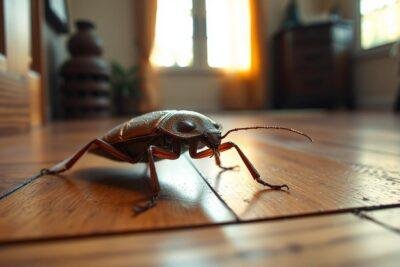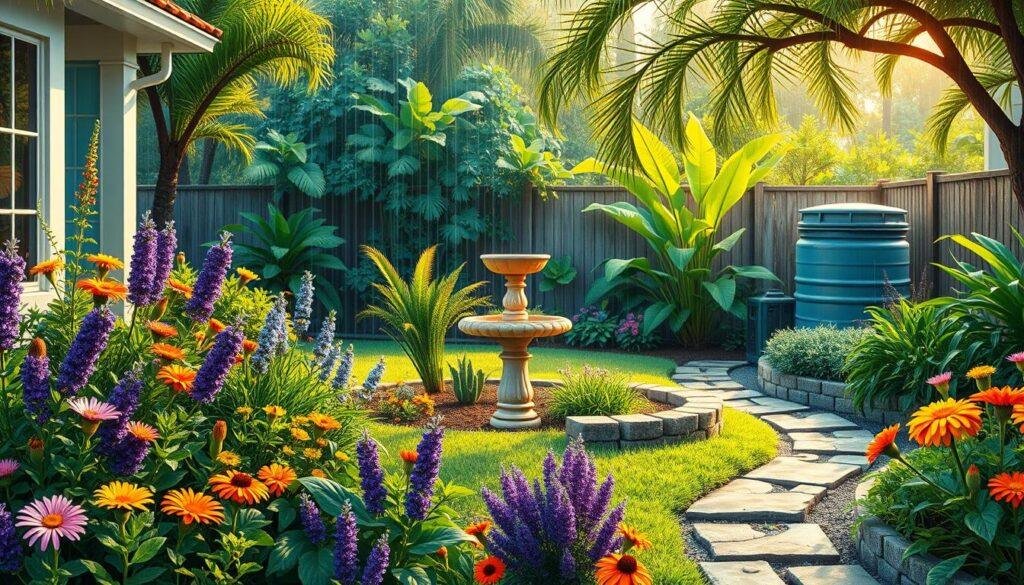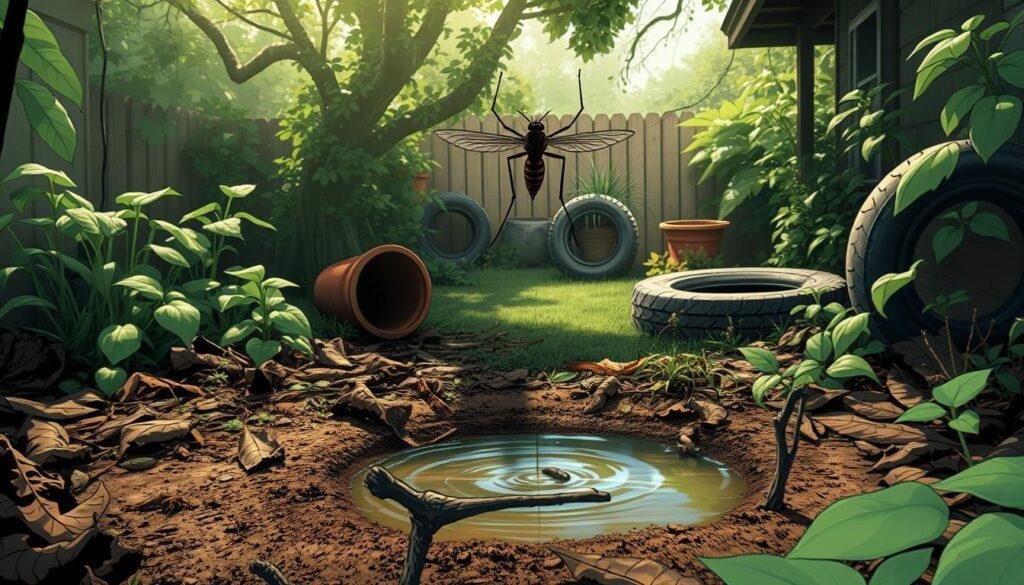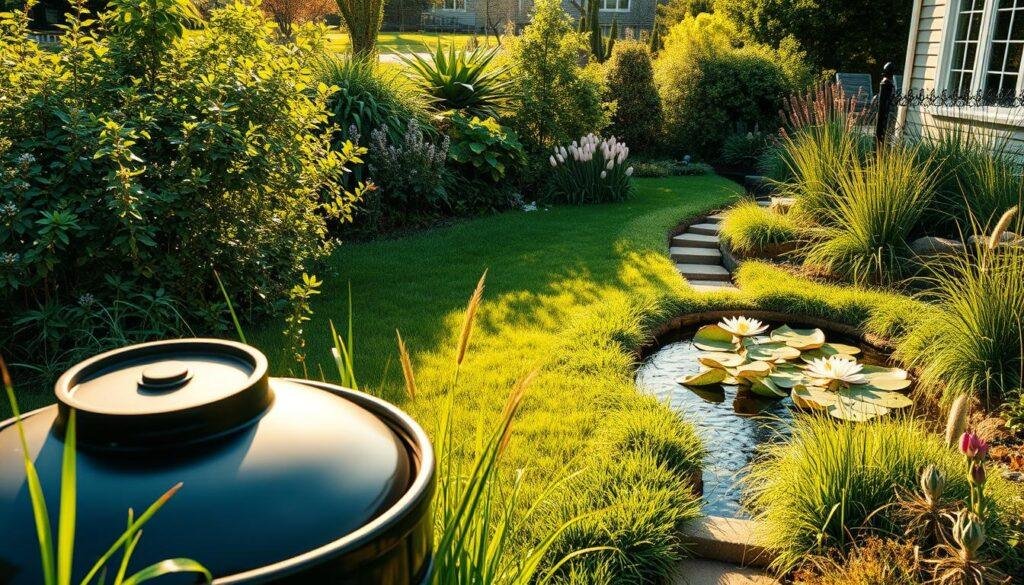
Preventing Mosquito Infestations in Florida Yards During Rainy Season

Did you know Florida is a top state in America for mosquito sicknesses? Roughly 1 in 6 people are affected each year. With the rainy season from June to October, mosquito activity in yards increases a lot. This raises the need for good tips to keep you and your loved ones safe.
It's key to know how to fight off mosquitos. It's not just about avoiding bites. It's also about keeping your yard free from these pests. Knowing where they breed and how to make your yard unwelcoming for them is key. By taking steps before problems start, you can keep your family and pets safe from mosquitos.
- Understanding the Mosquito Life Cycle
- Identifying Mosquito Breeding Grounds
- Yard Maintenance for Mosquito Control
- Effective Water Management Strategies
- Choosing the Right Plants for Your Garden
- Utilizing Natural and Chemical Repellents
- Installing Mosquito Deterrents
- Timing Your Outdoor Activities
- Educating Your Family and Neighbors
- FAQ
Understanding the Mosquito Life Cycle
The life cycle of mosquitoes is both fascinating and complex, consisting of several key stages that are heavily influenced by temperature and humidity—especially during Florida’s warm, rainy months. Understanding this cycle is essential for preventing mosquito infestations, as it allows homeowners to identify breeding areas and take timely action to reduce populations effectively.
The Stages of Mosquito Development
Mosquitos go through four main stages: egg, larva, pupa, and adult. Each stage has its own needs and features:
| Stage | Description | Duration | Conditions |
|---|---|---|---|
| Egg | Laid on water surfaces or in damp areas. | 1-2 days | Requires standing water. |
| Larva | Inhabits water; feeds on organic matter. | 5-14 days | Warm, stagnant water ideal. |
| Pupa | Non-feeding stage; preparation for adulthood. | 2-3 days | Quiet water necessary. |
| Adult | Emerges to mate and feed on blood. | Up to several weeks | Active in warm, humid conditions. |
Timing of Lifecycles in Florida
In Florida, the warm climate lets mosquito life cycles happen all year. There's a spike in activity during the rainy season. Mosquito eggs in warm standing water can become adults in just a week if conditions are right.
How Weather Affects Mosquito Growth
Weather greatly affects mosquito growth stages. Higher humidity and warmer temperatures mean they grow faster. Florida's weather is perfect for them. So, there's a need for constant efforts to keep mosquito numbers down.
Identifying Mosquito Breeding Grounds
It's crucial to watch for places where mosquitoes can breed to control them effectively. They need standing water to have babies, so homeowners must know where these spots are in their yards. Checking your yard often can help find these areas early, which allows for quick action.
Common Breeding Sites in Your Yard
There are many spots in your yard where mosquitoes can start their families. Look closely at:
- Puddles that collect after rainfall
- Birdbaths that are not emptied regularly
- Plant saucers that hold excess water
- Clogged gutters that trap standing water
Even though we might not notice them, these spots are perfect for mosquitoes. It's important to check these places and make sure they don't have standing water. This helps stop mosquitoes from breeding.
Importance of Standing Water Awareness
Knowing about standing water is key to keeping mosquitoes away from your home. When you know where water collects, you can take steps to keep mosquitoes from breeding there. This means checking areas that are easy to forget and taking simple steps to prevent water from collecting.

Yard Maintenance for Mosquito Control
Keeping your yard neat is key to fighting off mosquitoes. A tidy yard looks good and stops mosquitoes from breeding.
Regular Lawn Care Tips
To have a healthy lawn, do a few important things:
- Mow regularly to keep grass short, which mosquitoes don't like.
- Clear away leaves and debris to leave fewer hiding spots.
- Water early in the day to avoid water standing around.
The Role of Mulch in Mosquito Prevention
Mulch in your garden can help control moisture and stop mosquitoes. It does this by:
- Stopping soil erosion that can lead to water gathering.
- Reducing water evaporation for more even watering.
- Keeping out weeds that mosquitoes might hide in.
Pruning Overgrown Plants and Bushes
Tall plants and bushes can be havens for mosquitoes. Pruning them means:
- More air flow, which stops water from standing still.
- Less shade for mosquitoes looking for a cool place.
- Better visibility to see and deal with problems.
| Maintenance Task | Frequency | Benefit |
|---|---|---|
| Mowing Lawn | Weekly | Reduces hiding spots |
| Clearing Debris | As Needed | Eliminates breeding grounds |
| Watering Grass | 2-3 times per week | Controls moisture levels |
| Pruning Shrubs | Monthly | Improves air circulation |
| Applying Mulch | Seasonally | Prevents water retention |
Effective Water Management Strategies
It's crucial to control mosquito populations by managing water on your property. Managing standing water helps prevent mosquitoes. We'll look at ways to drain standing water and keep your yard pest-free.
Draining Standing Water
Mosquitoes breed in standing water. So, regularly check your yard for water buildup. Tasks to keep in mind include:
- Check flower pots and birdbaths weekly and change the water frequently.
- Ensure gutters and downspouts are clear to prevent water pooling.
- Inspect for leaks in hoses, pipes, and any outdoor fixtures.
Always drain standing water to stop mosquitoes from breeding. Even a little water can attract mosquitoes. Getting rid of these sources lowers the risk of infestation a lot.
Using Mosquito Dunks in Water Features
For areas where draining water isn't possible, like ponds, use mosquito dunks. These dunks have a safe ingredient for wildlife but kill mosquito larvae. Using them regularly can control mosquitoes without harming other animals.

Using these strategies helps homeowners effectively manage standing water. And they can enjoy their outdoor spaces without mosquitos all year.
Choosing the Right Plants for Your Garden
Improving your garden can greatly lower mosquito numbers at home. Adding plants that naturally keep mosquitoes away is a smart move. These plants make your yard look great and fight off annoying mosquitoes.
Mosquito-Repelling Plants
Some plants are great at keeping mosquitoes away. Here are some you might plant in your garden:
- Citronella - Its strong smell hides other smells.
- Marigolds - They release a compound that mosquitoes don't like.
- Lavender - It smells nice and its oil keeps mosquitoes away.
- Pennyroyal - This plant is good at pushing mosquitoes away.
- Basil - Both Sweet and Thai basil keep bugs away.
Creating a Natural Barrier with Shrubs
Adding the right shrubs to your yard makes your mosquito-fighting plants work better. Here's a guide to making a natural barrier:
| Plant/Shrub | Repellent Effectiveness | Ideal Planting Location |
|---|---|---|
| Citronella Grass | High | Near patios or places where people hang out |
| Lemon Balm | Moderate | By walkways and garden borders |
| Crushable Herbs (Mint) | Moderate | Among other plants in your garden |
| Gladiolus | Low | Where you want a splash of color |
This gardening approach reduces mosquitoes. Pick plants that suit your yard's look and can grow well in your weather. Choosing the right mosquito-fighting plants and shrubs creates a peaceful spot outside. With these natural barriers, your garden becomes a mosquito-free zone.
Utilizing Natural and Chemical Repellents
Combining natural and chemical ways is often needed to control mosquitoes. You can pick what works best for you and your yard. Natural repellents are eco-friendly, and chemicals are good for serious bug problems.
Essential Oils and Their Effectiveness
Essential oils are a nice change from chemicals. Oils like lemon eucalyptus, lavender, and citronella keep mosquitoes away. They also make outdoors smell great. These oils are good for a few hours, perfect for short times outside. Using them often helps, especially where there are a lot of mosquitoes.
Recommended Chemical Solutions for Yards
If mosquitoes are a big problem, chemicals might be needed. Products with DEET, picaridin, or lemon eucalyptus oil work well. They keep bugs away for a long time, great for outdoor events or yard time. Always follow directions to stay safe and get the best results.
| Type of Repellent | Key Ingredients | Duration of Effectiveness |
|---|---|---|
| Natural Mosquito Repellent | Lemon Eucalyptus, Lavender, Citronella | Up to 3-4 hours |
| Chemical Mosquito Repellent | DEET, Picaridin, Oil of Lemon Eucalyptus | Up to 8 hours |
Using both natural and chemical repellents is a good defense against mosquitoes. The best choice depends on your likes and the level of mosquito problems in your area.
Installing Mosquito Deterrents
Installing mosquito deterrents reduces the number of mosquitoes in your yard. Using traps, zappers, and yard sprays can protect you from these insects. This makes being outdoors more enjoyable.
Mosquito Traps and Zappers
Mosquito traps and zappers attract and kill mosquitoes. They often use UV light or carbon dioxide. This helps make your yard a better place for family and friends.
- Consider popular brands like Dynatrap or Mosquitno, known for their effectiveness in catching mosquitoes.
- Position traps and zappers strategically near breeding grounds for maximum impact.
- Regularly clean and maintain these devices to ensure optimal performance.
Recommended Yard Sprays to Use
Yard sprays are a fast way to reduce mosquitoes. Choose sprays that are safe for pets and children. Organic and natural options can protect the environment too.
- Products containing pyrethrins or neem oil can be effective yard sprays.
- Apply sprays during peak mosquito activity times, typically in the early morning or late evening.
- Reapply as needed, especially after heavy rain, to maintain effectiveness.
Timing Your Outdoor Activities
Knowing how mosquitoes behave helps a lot when you want to avoid them outside. By figuring out their active times, planning events becomes easier. This way, you can have fun outdoors and not worry too much about mosquitoes.
Best Times to Be Outdoors
Mosquitoes are mostly out at dusk and dawn. So, if you do things at other times, you’ll run into fewer mosquitoes. Try to have events in the early morning or around noon for a better time outdoors.
Planning Activities Around Mosquito Habits
To deal with mosquitoes, think about when they’re most active while planning. Here are some tips to keep in mind:
- Schedule picnics and gatherings for late morning or early afternoon.
- Use mosquito repellents if you must be outside during early evening or late night.
- Avoid leaving food uncovered, as it attracts mosquitoes.
- Incorporate mosquito-repelling plants around your activity areas for added protection.

Educating Your Family and Neighbors
Creating a mosquito-free area starts with you at home. Teaching your family and neighbors is crucial. It helps everyone know how to stop mosquitos together. When all understand the dangers and what to do, the whole community wins. Fewer mosquitos will be around.
Community Initiatives for Mosquito Prevention
Neighborhoods can really benefit from working together on mosquito issues. Activities like workshops teach people how to keep their yards clean and manage water right. This teamwork helps everyone fight mosquitos better. It allows for sharing tips and successful ways to keep mosquitos away.
Sharing Tips and Resources with Neighbors
Then, it’s important to share what works with others. Talking about the best ways to control mosquitos, swapping natural repellents, or reminding each other about yard up-keep helps a lot. These shared small steps build a culture of being ready and active against mosquitos. They make all our outdoor areas safer for everyone.
FAQ
What are some effective mosquito prevention tips for my yard?
How can I reduce mosquito breeding grounds in my yard?
When are mosquitoes most active in Florida?
What are some natural mosquito repellents I can use?
Are there any effective mosquito control strategies for my yard?
How should I manage standing water in water features?
How can I engage my community in mosquito prevention initiatives?
What types of physical barriers can I install for outdoor mosquito protection?
What are the best ways to avoid mosquito bites?
Whether you’re tackling a single rogue ant or battling a full-scale termite invasion, our guide has you covered. Save Preventing Mosquito Infestations in Florida Yards During Rainy Season to your bookmarks and visit often—we refresh tips, treatment methods, and product reviews throughout 2025 so you can keep every pest problem under control the moment it appears.

Leave a Reply